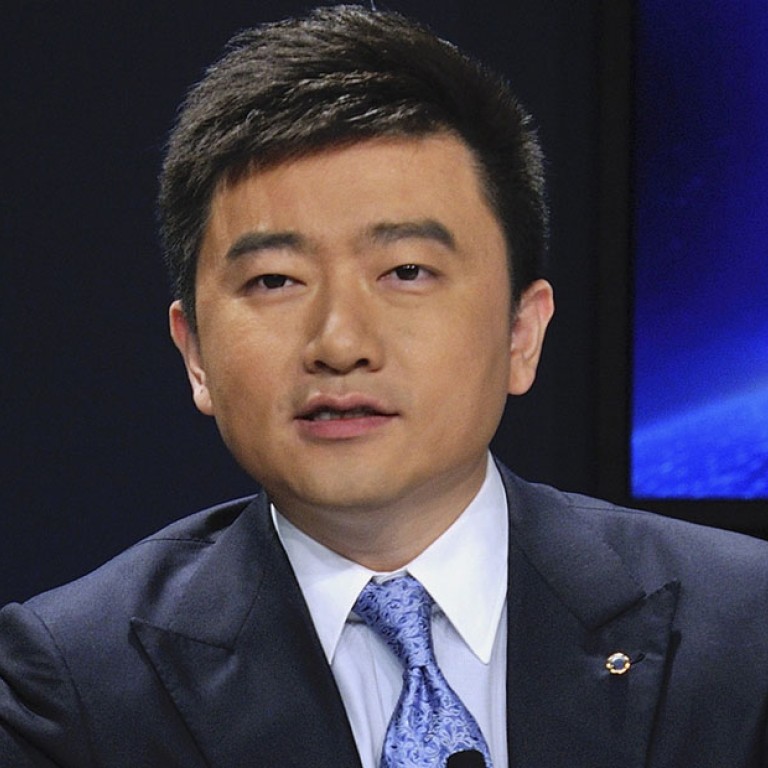
Fall of Rui Chenggang, celebrity news anchor, reveals the fault in our stars
The removal of Rui Chenggang over graft allegations highlights the tangled relations between state-run media and state power
Almost every weekend of late, the Communist Party's anti-graft watchdog has announced the new captures of more "tigers" - or senior corrupt officials.
But the Central Commission for Discipline Inspection's most significant capture last week was not a big cat, but rather a "fly" - a lower-ranking corrupt official - Rui Chenggang.
Rui, a leading anchor with state broadcaster CCTV was taken away for investigation on suspicion of corruption.
When President Xi Jinping launched his anti-graft campaign, he pledged to take down not just the tigers, but also the flies. The campaign and its accompanying austerity drive has been hot on the heels of not only party officials, but also members of state-owned enterprises and other institutions where opportunities reside for ill-gotten gains.
CCTV has come in for its share of scrutiny of late. Rui is a low-ranking cadre in the broadcaster's hierarchy. But as the mainland's most influential media outlet, it has been seen as leading the high-profile charge to expose graft: just recently, it touted the capture of 35 "tigers" in the 20 months since Xi took power in November 2012.
The news network is also viewed as an extremely useful propaganda tool abroad. For years, Rui, 37, who joined CCTV in 2003, has been seen as a symbol of China's rising "soft power". He gained fame for his nationalistic stance, leading a campaign opposing the opening of a Starbucks outlet inside the Forbidden City in 2007, which he described as an "erosion of Chinese culture".
He also caused a stir in 2010 when he claimed to "represent the whole of Asia" while raising a question with United States President Barack Obama at a G20 summit. He caused further controversy when he asked then American ambassador Gary Locke if he should fly economy class, given all the money the US owes China.
So, given Rui's near-celebrity status, he is by no means a truly small "fly". Speculation about his fate dominated state media and social networks last week.
"The impact of his detention is bigger than the detention of a provincial- and ministerial-level official," Xinhua reported.
"Rui's detention has again sent a strong signal that corruption is not a problem that is only among officials - other authoritative figures in society can also commit corruption," the stated.
"As a public figure, Rui's arrest has special implications, marking the extension of China's anti-corruption campaign from the usual targets of government officials to the less usual targets of medical personnel, university professors and media workers," the ' English edition said.
While no official explanation has been given for his detention, rumours are swirling that Rui used his influence at CCTV for personal gain.
As journalists are supposed to be at the forefront of the anti-graft fight, Rui's case highlights the tangled relationship between state-run media and state power on the mainland.
State news outlets, the government's main propaganda tools, have morphed into leading players of show business that function not unlike public relations agencies for the rich and powerful. Like their Western counterparts, it is common for celebrities or influential journalists to set up public relations firms that charge clients fees to either promote positive reports or ignore negative ones. On Weibo, commentators have said Rui's most valuable asset - his access to influence - had become his liability. The saga also highlights the inherent hypocrisy of one-party rule, in which officials are often two-faced, championing party ideology while readily ignoring those same ideals for personal gain.
Rui's case lends credence to German philosopher Friedrich Nietzsche's observation that "the surest way to corrupt a youth is to instruct him to hold in higher esteem those who think alike than those who think differently".

